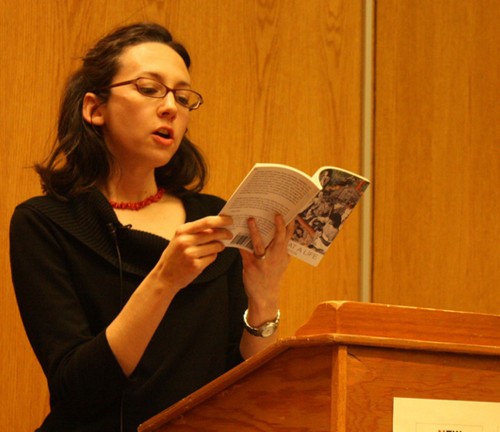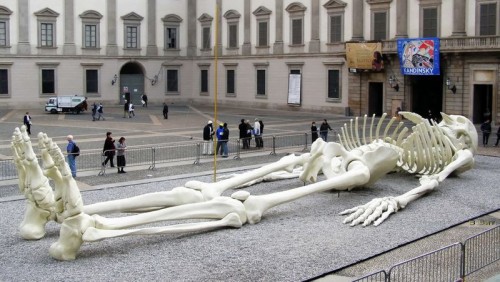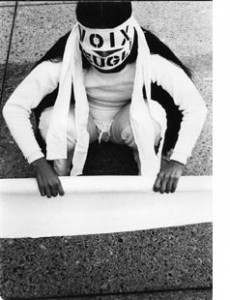William Trevor v. The Idea of Experimental Writing
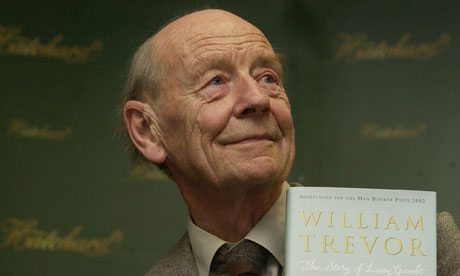
From the Paris Review interview:
No, I think all writing is experimental. The very obvious sort of experimental writing is not really more experimental than that of a conventional writer like myself. I experiment all the time but the experiments are hidden. Rather like abstract art: You look at an abstract picture, and then you look at a close-up of a Renaissance painting and find the same abstractions.
Richard Kalich’s Penthouse F
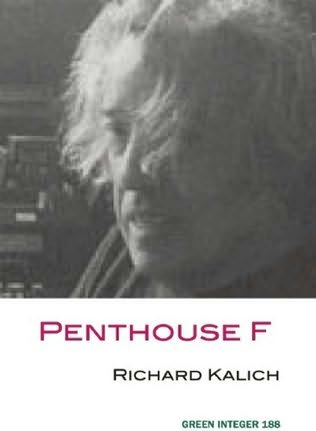 I just finished reading Richard Kalich’s Penthouse F, which is brand new from the always provocative Green Integer. I was surprised to not have previously heard of Kalich despite his three previous books having been lauded by Brian Evenson (“Kalich is after what it means to be profoundly out of step with one’s culture yet still unwilling to let go of the American dream”) and various fantastic others. As soon as I opened the book just casually after having gotten it in a stack from the mail, I found myself compelled to start reading it posthaste, as the way the book is set up, as a mishmash of interviews conducted in a trial, documents pertaining to said trial, and the author’s personal interjections, it was clear that this book is of the kind that once you start you just want to keep reading both to find out what happens, and in this case, the strange way it makes what happens work. I’ve since bought everything else by Kalich I can find (nameably The Nihilesthete (1987) & The Zoo (2001) & Charlie P (2005)).
I just finished reading Richard Kalich’s Penthouse F, which is brand new from the always provocative Green Integer. I was surprised to not have previously heard of Kalich despite his three previous books having been lauded by Brian Evenson (“Kalich is after what it means to be profoundly out of step with one’s culture yet still unwilling to let go of the American dream”) and various fantastic others. As soon as I opened the book just casually after having gotten it in a stack from the mail, I found myself compelled to start reading it posthaste, as the way the book is set up, as a mishmash of interviews conducted in a trial, documents pertaining to said trial, and the author’s personal interjections, it was clear that this book is of the kind that once you start you just want to keep reading both to find out what happens, and in this case, the strange way it makes what happens work. I’ve since bought everything else by Kalich I can find (nameably The Nihilesthete (1987) & The Zoo (2001) & Charlie P (2005)).
The main meat of the proceeding involves the author himself, and what becomes an increasingly strange question as to the nature of his work. The book opens with a series of notes the author had scribbled years back re: the creation of the book itself, and leads therein into an investigation of said proceedings: which directly involve the author’s implication in the matter of a suicide by a young man and woman who had come to live with the author, and then decided to jump to their death from his apartment’s window. The trial, then, is of the author, wherein the question of his involvement in those deaths is being examined, particularly seeing that the literary work he’d been directly mirrored the relationship with the boy and girl, and in fact, gives his story, on paper, as a reflection of life, an end. A question then as to the author’s responsibility for his arrangements and imaginations, as well as where the line between fantasy and reality is drawn, is processed through his character, his actions, and his work.
March 3rd, 2011 / 5:11 pm
Geography Thursday: Land in water, landing on land
Pithy quotes about islands and humanity are plentiful and sift their way through our brains such that we are always aware of the metaphor of the island, fearful of our own loneliness and despair, careful of misstep, lest our desire for excitement and remembrance lead us to a fate like Robinson Crusoe. Wait: is Robinson Crusoe still in our consciousness? Or do you imagine, instead, a furry-faced Tom Hanks finding solace and friendship in a volleyball?
But islands do not have to be desolate. They can abound with exotic fruits and hammocks. They can be spaces for rejuvination and hope. They can promise hot romance, or something like that. It just depends on your conception of island. For most of us, popular culture tells us that islands – no matter how remote – offer nothing short of exotic and erotic adventure. Think: Gilligan. Think: Lost. Think: Survivor.
March 3rd, 2011 / 4:39 pm
On Memoir and Experiment: The Chronology of Water by Lidia Yuknavitch
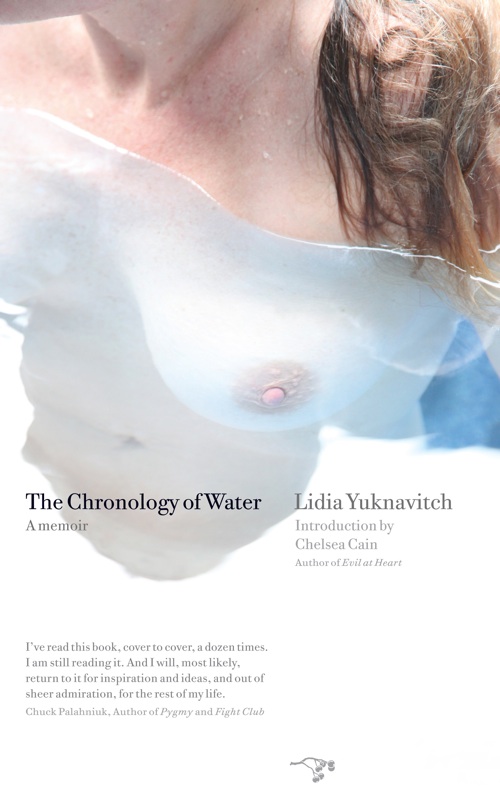 I’ve spent the two days reading and re-reading Lidia Yuknavitch’s The Chronology of Water. After years of avoiding memoirs and thinking they were not for me, the past several months, I’ve been reading all kinds of memoirs and learning about the many different approaches to the genre. I might have to admit I really love memoirs. I don’t know if it’s because I’m very curious about the lives of others or if I am drawn to the confessional in nonfiction as much as I am in fiction but right now memoirs are speaking to me pretty seriously.
I’ve spent the two days reading and re-reading Lidia Yuknavitch’s The Chronology of Water. After years of avoiding memoirs and thinking they were not for me, the past several months, I’ve been reading all kinds of memoirs and learning about the many different approaches to the genre. I might have to admit I really love memoirs. I don’t know if it’s because I’m very curious about the lives of others or if I am drawn to the confessional in nonfiction as much as I am in fiction but right now memoirs are speaking to me pretty seriously.
I first heard about the book because I saw the cover here and last week I read this awesome essay on The Rumpus, by the author, about the cover and the heresy of a woman’s bared breast, nipple and all, on that cover. Then I heard about the book from a friend so I ordered it and the book arrived and I read it almost immediately and then I read it again and one more time for good measure.
The book itself is a fine, heavy object both literally and figuratively. The cover is gorgeous and when you read the book you’ll realize how appropriate it is to the writing. But even more than that, the paper is thick and slick and the design is clean and the cover has a nice matte coating. I enjoy these small details that contribute to a sensual, in the very sense of the word, reading experience.
In my previous posts about memoir, I’ve discussed how I find it difficult to review memoirs because it feels like you’re doing more than critiquing the writing, you’re also critiquing the life lived. This isn’t a review as much as it is me talking about a book that is really powerful and unlike any memoir I’ve yet read. I’m also interested in how this book can be used for teaching because it challenges the traditional memoir in really interesting ways and because, selfishly, one of the graduate students I’m serving on a committee for is writing a memoir as his thesis and these notes will help me in my work with him. As I’ve thought through this book, I’ve considered the various elements that really mark a shift from what I traditionally see in memoir writing: how the narrative deals with the body, how the memoir can be read as an open text through the use of absence, language invention, an alinear narrative structure, and decadent but controlled descriptions of emotion. Of course I’m going to end with emotion.
March 3rd, 2011 / 3:30 pm
What is Experimental Literature? {Five Questions: Danielle Dutton}
Danielle Dutton is the author of S P R A W L (shortlisted for the 2010 Believer Book Award) and Attempts at a Life. She designs books at Dalkey Archive Press; teaches in the Jack Kerouac School of Disembodied Poetics at Naropa; and runs Dorothy, a publishing project.
Meg Pokrass Damn Sure Right Interview!
Q: Sans enunciation/emphasis or other context, your title Damn Sure Right is open-ended: braggadocio or bluster, surprise or satisfaction—and so on. The person on the cover photo is “dressed to kill” (my words), yet is also more than half hidden. What is your idea concerning the title and the cover image?
A: The title comes from an utterance in the story “Damn Sure Right”. The full utterance is, “He didn’t need to hurt her, damn sure right.”
My characters are often groping for a concrete way to see things in order to feel better.
To me, the cover photo reflects vulnerability mixed with stalwart determination. Press 53 publisher, Kevin Morgan Watson found the image, ran it past me and we were in instant agreement.
Q: Will you discuss “The Serious Writer and Her Pussy”?
Hot shit flies in this fly shit at Interview where Will Oldham interviews R Kelly: “It’s like you go to parties and they give you these little bags. I got everything I can ever want, and I’ve been blessed, but I want that little bag, you know? I want what’s in the bag. You’re like, “Where my bag at, dawg?” And they’re like, “Ah, we ran out, man.””
Concept Flash
The Concept Flash is not about an emotion (that would be expressionism, aka Kafka), but rather something larger, an idea.
The idea is then set, into concrete.
The logic of the idea follows the dialectic of the concept. This can assist you, in a structural sense, or even with the setting, characterization, narrative, etc. The attributes of the concept can be appropriated for technique within the flash. The concept flash is infinite in its manner. You could write a lifetime of these: ideas in our lives represented as things. Stop digging holes with your fingers. I am offering a type of shovel. OK, a spoon.
Will you shut up and provide an example?
Yes, I will provide an example.
Cube by Amelia Gray.
Theresa Hak Kyung Cha: Retrospective Birthday Celebration
I’m sad I can’t make this. Because I don’t live in New York.
Belladonna* and Kundiman Celebrate: Theresa Hak Kyung Cha
Saturday, March 5, 2011; 2 – 3:30 pm
On the weekend of what would have been Cha’s 60th birthday (a full life cycle event in the Chinese/Korean lunar calendar), Belladonna* and Kundiman gather nine poets to perform a staged reading from Dictee. Cha’s best known written work, Dictee focuses on the life of several women framed with the art of the Greek muses, yet in the cosmos of Shamanism and Daoism. Their struggle to speak and overcome suffering is enacted through a mixture of media which destabilizes the notion of a progressive and seamless history.
Participants to include: Anne Waldman, Tamiko Beyer, Sarah Gambito, Laura Hinton, Cathy Park Hong, Soomi Kim, Nathanaël, Alison Roh Park, Sina Queyras, Jen Shyu, Zhang Er
Join us for an afternoon of projected images, voices, pictorial characters, scholarly contextualization, a birthday cake, and surprises.
Event is being filmed for Woo Jung Cho’s documentary on Theresa Hak Kyung Cha, The Dream of the Audience.
Curated by Cara Benson and Sarah Gambito
When: Saturday, March 5
Door: 1:40pm; Show: 2pm to 3:30pm [PROMPT]
Where: Bowery Poetry Club, 308 Bowery, NYC
Cost: $8


